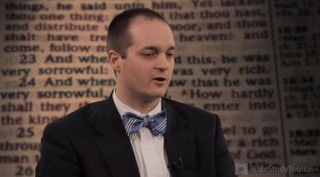- Recent Translations
- All Translations
1 Peter 1:6
Share
Settings
1 Peter 1:6 Meaning and Commentary
Wherein ye greatly rejoice
The Vulgate Latin version reads, "in which ye shall rejoice": and so the Syriac version, adding, "for ever"; and refer these words to the "last time"; or, times spoken of in the preceding verse; when the saints will greatly rejoice, being in full possession of eternal salvation; in distinction from the present time, in which they are in heaviness; but it is better to read the words in the present tense, and as expressive of the saints in this life, who are blessed with that fruit of the Spirit, joy, and have always reason to rejoice, and greatly rejoice. The connection is with the whole that goes before; and the sense is this, that regenerated persons rejoice, in that they are the elect of God, according to his everlasting love towards them, and free grace, and good will; in their regeneration, which is an evidence of their election of God; in the abundant mercy of God displayed in their regeneration; and in that lively hope of eternal life which is the effect of it; and in the resurrection of Christ from the dead, which secures their justification of life, and their resurrection from the dead; and in the inheritance they are born heirs unto; and in their preservation to it by the power of God through faith; and in that complete salvation which is ready for them, and in a short time will be revealed, to which they are kept:
though now for a season, if need be, ye are in heaviness, through
manifold temptations.
This seems to be a contrast, but is no real contradiction; for the character of the saints in this world is, that they are as sorrowful, yet always rejoicing, ( 2 Corinthians 6:10 ) rejoicing even in their tribulations and temptations; yea, for them, and on account of them, in some respects, which in others make them sorrowful, and heavy, or "heavy" with sorrow: the cause of this heaviness is not only indwelling corruptions, the hidings of God's face, and the temptations of Satan, but afflictions and persecutions, which are here meant by "manifold temptations"; for not the temptations or to sin, are here intended, but the temptations with which God tempts and tries his people: so he sometimes does, by calling them to hard service, to do things difficult and disagreeable to flesh and blood, in which way he tempted Abraham; and by laying afflictions, or suffering afflictions to come upon them, by which he tried Job; and by permitting wicked men to reproach and persecute them, and to injure them in their characters, persons, and properties; and which was the case of the primitive Christians, and has been more or less the case of the saints ever since: now such exercises are called, from the quality of them, temptations, or trials; because they try the hearts, principles, and graces of them that believe, and particularly their faith hereafter mentioned; and from the quantity of them, they are said to be various; they are of different sorts; as reproach, imprisonment, loss of goods, and death itself in divers shapes; and are more or less at different times and ages; and are exercised on various persons: and are sometimes very heavy, and grievous to be borne, and cause great heaviness and sorrow of heart; and yet there are things, and circumstances, and which are here hinted at, that greatly mitigate the heaviness occasioned by them; as, that these afflictions, and the heaviness that comes by them, are but little, and light, in comparison of the eternal weight of glory; though they are great tribulations in themselves, through and out of which the people of God come to the kingdom; and so the Syriac version renders it, "though at this time" (lylq) , "ye are a little made sorrowful"; and then it is only "now", for the present time, and but for a short time; for a little season, even for a moment, comparatively speaking; and also, "if need be", which the Syriac version omits, though by all means to be retained: afflictive dispensations, in whatsoever form, are necessary, by the will of God, who has appointed them, and therefore must be, and ought to be, quietly submitted to, and patiently borne, on that consideration; and are also necessary, on account of Christ the head, to whom there must be a conformity of his members; and likewise on their own account; for the humbling of their souls; for the weaning of them from the things of this world; for the restraining, subduing, and keeping under the corruptions of their nature; and for the trial of grace: and it is only "if", and when there is a necessity for them, that they are in heaviness by them; otherwise God does not delight to afflict and grieve the children of men, and much less his own; see ( Lamentations 3:33 ) so the Jews say F25, that (Kruwh) , "there was a necessity" of God's tempting Abraham as he did, to humble and purify him.
F25 Tzeror Hammor, fol. 22. 1.




